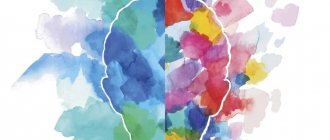Good sleep doesn't just give you energy - it affects the balance of hormones, weight, mood and overall health of the body. Lack of sleep at night leads to exacerbation of somatic and psychiatric diseases, reduces social function and motivation for any activity.
The prevalence of sleep problems is high and increasing. The incidence in the adult population is up to 30%, with women and the elderly more susceptible to this disease. Unfortunately, people often ignore the first manifestations, which is why the condition progresses and leads to depletion of the nervous, immune and other body systems. Therefore, it is important to understand what sleep disorder syndrome is and what its symptoms are. This will help you take timely measures and avoid dangerous consequences.
Sleep disorder has the following types:
- Insomnia - insomnia
- Hypersomnias - excessive sleep duration
- Parasomnias are a sleep disorder that manifests itself in motor and mental pathologies (nightmarish dreams, nocturnal muscle cramps, sleepwalking, etc.)
- Circadian rhythm disorders
- Breathing disorders during sleep
- Sleep movement disorders
A key place among these conditions, as the most common and clinically significant disorder, is insomnia (insomnia). This is a recurring disorder of falling asleep and maintaining sleep, in which the following symptoms are observed:
- Difficulty falling asleep
- Frequent awakenings at night
- Waking up too early without feeling fully rested after sleep
- Feeling tired, groggy and irritable during the day
It is believed that an adult needs an average of 7-9 hours of good sleep, school-age children need up to 11 hours, and older people need about 7 hours. In fact, these recommendations are conditional, since the need for rest is influenced not only by age, but also by the characteristics of the body, lifestyle and current events. Therefore, whether sleep is disturbed or not determines not only the number of hours, but also the quality of sleep and a person’s feelings after waking up. If you spend 8 hours in bed, but continue to feel lethargic and tired, then it makes sense to be wary of developing insomnia.
Causes of sleep disturbance in adults
Insomnia is a reaction of the central nervous system to one or several factors that negatively affect the human body.
The following reasons are identified that can disrupt the sleep process, depriving a person of proper rest at night or during the day:
- psycho-emotional stress;
- daily stressful and conflict situations at home and at work;
- unfavorable conditions in which the process of falling asleep occurs (hard bed, noise in the room or neighboring rooms, time zone change);
- long-term use of medications containing active substances that affect the functioning of the central nervous system, psychosomatic reactions (antidepressants, nootropics, corticosteroids, psychostimulants);
- alcohol abuse, when a person develops a stable dependence on alcohol;
- taking narcotic drugs (substances contained in cocaine, LSD and marijuana have a stimulating effect on the psyche, provoking a prolonged period of wakefulness, a surge of vitality and energy);
- the presence of concomitant neurological and psychosomatic disorders;
- diseases of the endocrine system in the form of hypoglycemia,
- caused by diabetes mellitus, hypothyroidism or thyrotoxicosis of the thyroid gland;
- chronic obstructive bronchitis, asthma of allergic etiology;
- esophageal type gastric reflux, ulcer, intestinal gastroduodenitis, heartburn;
- irregular work schedule, night shifts in production;
- foci of chronic infection located in the tissues of internal organs, which cause fever, the appearance of low-grade fever, and disrupt night sleep;
- cardiovascular pathologies, manifested by arrhythmia, tachycardia, angina pectoris, slow heart rate;
- hypertension or chronic hypotension;
- consequences of a traumatic brain injury, progressive Parkinson's disease, age-related or intoxication dementia;
- conditions of the body accompanied by attacks of acute pain (arthritis of the joints, stage 3-4 cancers, intestinal obstruction, brain oncology, phantom pain after amputation of limbs);
- dermatological diseases, which are accompanied by severe itching of the skin and the formation of trophic ulcers;
- specific conditions that manifest themselves exclusively during sleep - apnea, restless legs syndrome, Pickwick, teeth grinding;
- prolonged depression, schizophrenia, anxiety and obsessive states, as well as other mental disorders;
- old age.
Sleep disturbance in adults can occur suddenly without obvious reasons.
According to medical statistics, in 15% of cases it is not possible to determine the true cause of insomnia. In addition, the process of diagnosis and treatment is complicated by the patient’s incorrect actions in the form of attempts to self-treat insomnia by taking medications or drinking alcohol immediately before going to bed.
Why does a person have insomnia?
Sleep problems regularly occur in 40–50% of people. And, as a rule, insomnia most often overtakes women. They are more prone to worry and think about everything in detail.
Very often, women's sleep disorders are associated with their psychological state. Hormonal changes during pregnancy and menopause increase anxiety. The state of the female psyche at this time is not stable. All these symptoms interfere with normal sleep
Sleep disorders can occur for various reasons. It can be:
- Stress;
- Excessive abuse of coffee and caffeinated drinks;
- Violation of the daily routine;
- Alcohol consumption;
- Mental illnesses;
- Mental stress;
- Taking medications;
- Anxiety before an important event;
- Noise in the sleeping area, lack of silence and comfortable conditions;
- Night work;
- Overeating, especially eating fatty foods;
- Smoking;
- Overwork;
- Muscle tension.
Types of diseases that cause sleep disturbance in adults
Sleep disturbance in adults, the treatment of which requires the use of sedatives and sedatives, is classified according to the type of psychosomatic disorder. The table below lists the types of disorders of the sleep process, falling asleep and the functioning of internal organs that are at rest.
| Type of sleep disorder | Characteristics of the pathological condition |
| Insomnia | A classic manifestation of a disorder in the process of falling asleep and staying asleep. The patient may lie in bed for 1-3 hours and unsuccessfully try to sleep. Signs of insomnia are restless, shallow and interrupted sleep. This type of disease occurs in people of all age groups. The manifestation of the disease is associated with psychosomatic disorders, restless legs syndrome, stress and nervous strain. |
| Hypersomnia | Unlike insomnia, this type of pathological condition is characterized by increased drowsiness. A person constantly feels sleepy. Similar symptoms are present both at night and during the day. Hypersomnia significantly reduces the patient’s quality of life and increases the risk of accidents. The most common causes of hypersomnia are taking medications, endocrine and cardiovascular diseases, and alcoholism. |
| Parasomnia | One of the most severe and dangerous sleep disorders. It manifests itself as sudden attacks of fear, suffocation, convulsions that lead to awakening, shortness of breath, and sweating. Parasomnia is characterized by disruption of the functioning of internal organs and systems. For example, sudden cessation of breathing, bedwetting. |
The type of sleep disorder is determined by the attending physician based on the results of an examination of the patient, the presence of current symptoms and clinical manifestations of the disease. Based on this, a further treatment regimen is selected.
How can a doctor help?
Patients suffering from insomnia 3 times a week or more turn to a neurologist who studies the causes of this pathological condition. He will find a way to calm down and fall asleep when stressed, and will also prescribe a course of sedatives and effective tranquilizers.
Donormil Phenazepam Diphenhydramine
In more complex cases, when insomnia from stress lasts more than 3 months, a comprehensive consultation with 2-4 specialists is required.
Diagnosis of sleep disorders in adults
Sleep disturbance in adults, treatment of which begins only after a comprehensive examination of the body, requires the following diagnostic methods:
- collecting anamnesis about the general health of the patient;
- maintaining a separate schedule of periods of sleep and wakefulness (the patient is in the inpatient department of the hospital under the supervision of doctors, or records the specified data independently);
- conducting polysomnography;
- laboratory examination of venous and capillary blood;
- Ultrasound of tissues of internal organs, if the patient has a history of concomitant diseases of the endocrine, digestive, and cardiovascular systems;
- CT scan of the brain for possible detection of organic lesions and tumors;
- submitting morning urine for biochemical testing.
The above examination methods are performed in a public hospital or in a private clinic. In the latter health care institution, the cost of the examination will be 3500-4000 rubles. In the state clinic, diagnostic procedures are free.
Diagnostic measures
If a person goes to the doctor and says a phrase like “I can’t sleep,” then polysomnography is first prescribed. During the study, the patient's condition is monitored by a somnologist in a special laboratory. The patient must spend the night in it. Previously, various sensors are connected to it to record the bioelectrical activity of the brain, the functioning of the heart, respiratory movements, the amount of inhaled and exhaled air, blood oxygen saturation and other indicators. They also monitor the person’s blood pressure.
The entire process is recorded on video. There is always a doctor on duty in the ward who can help if you feel unwell.
Thanks to the study, it is revealed how sensitive the patient’s sleep is, whether he feels anxious or not, also during the study:
- They study the state of brain activity.
- The features of the functioning of the main body systems are analyzed throughout all phases of sleep.
- The main causes of deviations are identified.
Average sleep latency may also be examined. The examination diagnoses narcolepsy and identifies other causes of drowsiness. During the procedure, the patient tries to fall asleep five times. The duration of each attempt is about twenty minutes with a break of two hours. Thus, the time during which a person falls asleep is calculated. If it is less than five minutes, then the person is suffering from drowsiness. The normal rate is 10 minutes.
We recommend reading! Click on the link:
Evening tablets for good sleep
The examination method is selected if indicated. Short-term sleep or problems falling asleep, periodic awakenings require treatment. The doctor will select a remedy that the patient will have to take for a certain time. The course may have different durations.
When to see a doctor
Sleep disturbance in adults, the treatment of which takes from several days to 6 months, requires timely contact with a neurologist, psychiatrist or psychotherapist. The choice of a doctor with the appropriate specialization depends on the presence of concomitant symptoms of a sleep disorder, as well as on the causative factors that caused it.
If an adult cannot sleep for 3 nights in a row, or his sleep is intermittent with frequent awakenings, then this is a good reason to consult a doctor.
The article discusses effective methods for treating sleep disorders in adults.
Sleep disorder is not a dangerous disease, but it may be one of the signs of an existing pathology. It is also possible that serious complications and health problems may develop due to the lack of proper rest for internal organs.
Types of insomnia
There is a classification of sleep disorders adopted by specialists, where the types of insomnia are prescribed.
Somnologists distinguish several types of disorders.
- Situational insomnia, which is associated with psychological stress. It can occur as a result of a change of place of residence, a flight, or a transition to another time zone. It can be triggered by a cold and other things that cause anxiety.
- Short-term - loss of sleep is caused by strong emotional shocks, for example, anxiety over a breakup or physical pain.
- Chronic insomnia occurs as a result of serious emotional trauma; the patient cannot sleep more than 3 days a week. This pathology is associated with an emotional disorder; such neurosis increases the patient’s suffering by weakening the nervous system.
Quality sleep after stress restores nerves, improving overall condition. What conditions and signals indicate that everything is not okay?
Prevention of sleep disorders in adults
In order to prevent sleep disturbances and maintain the health of the body and its systems, it is necessary to follow simple prevention rules every day that ensure high-quality sleep hygiene.
They consist of the following actions:
- adhere to a predetermined daily routine;
- go to bed and wake up from sleep at the same time;
- sleep on the same bed, do not fall asleep on the sofa or anywhere else in the house;
- do not take medications and drinks that increase the activity of the central nervous system (coffee, strong tea, alcohol, antidepressants);
- avoid eating immediately before bed;
- provide the body with a sufficient level of physical activity in the form of sports such as athletics, cycling, swimming (do not perform exercises in the evening);
- do not go to bed on an empty stomach (you are allowed to drink a glass of warm milk with honey, cocoa or kefir);
- before going to bed there should be no intense mental stress that requires concentration and prolonged concentration;
- avoid stressful, conflict situations, psycho-emotional stress;
- before going to bed, engage in an activity that calms the nervous system and helps you fall asleep quickly (reading a book, prayer, meditation, watching television);
- you need to fall asleep only in favorable conditions, so that there is no noise in the house, the lighting in the room should be turned off, there should be no drafts, the night curtains should be drawn;
- the bed for sleeping should be soft, even and comfortable; excessive deflection of the mesh or excessive rigidity is not allowed;
- You should not drink more than 150 ml of water at night (otherwise sleep may be disturbed by an overfilled bladder);
- the room where night sleep takes place must be well ventilated and saturated with a sufficient amount of fresh air;
- You need to go to bed as soon as the first signs of drowsiness appear.
If a person goes to bed, and after 30 minutes. sleep has not come, then you can’t stay in bed. It is necessary to turn on the light in the room and occupy yourself with something distracting that requires concentration. The best option would be to read a book, solve a crossword puzzle, collect construction sets, puzzles or mosaics.
Folk remedies for insomnia
To fall asleep quickly and have a normal sleep, you can try the following options:
- Drink a glass of warmed milk with honey at night;
- Boil 50 grams of dill seeds in 0.5 liters of red wine over low heat for about an hour. Cool, strain. Take one tablespoon shortly before bedtime. This is a harmless remedy. Even if you need to drive the next day, there will be no harm, because... all alcoholic and intoxicating substances are evaporated from the wine during boiling;
- Pour one or two teaspoons of hop cones into a glass of boiling water. Leave the resulting mixture for 3 – 4 hours. Strain and consume before bedtime;
- Lavender oil also works great. You can rub whiskey with it in the proportion of a couple of drops of oil per spoon of sugar;
- Wash your feet before going to bed. Thus, fatigue will be relieved, and the nervous system will be able to calm down;
- You can also dilute a spoonful of honey with warm water and drink it at night.
Treatments for sleep disorders in adults
Therapy for sleep disorders in adults can be based on medications, traditional medicine recipes, or the use of psychological methods. Each of the following methods is effective in its own way and may be suitable for patients with sleep disorders.
Medications
Drug therapy is the most effective way to treat insomnia in adults. Especially if sleep disturbance is caused by stress, anxiety, or concomitant psychosomatic diseases.
In this case, the following drugs are used:
- Ivadal is a potent sleeping pill, produced by the manufacturer in tablet form, prescribed 10 mg immediately before bedtime; for older people, the dose is reduced by 2 times (the duration of therapy is from 2 days to 4 weeks, depending on the type and severity of the sleep disorder);
- Adorma - prescribed to take 1 tablet (5 mg) over 5-10 minutes. before going to bed, short-term sleep disorders require a treatment duration of 5 days, more severe clinical cases may require treatment for a period of 1 month. (the drug is prescribed with caution to patients with renal failure);
- Sanval - one tablet of the drug contains 5 mg of the substance zolpidem tartrate, 1 tablet is prescribed before bedtime, and the maximum daily dose of the drug should not exceed 10 mg (for elderly patients, the dosage is reduced by 2 times);
- Donormil is an effective drug for insomnia, take 1 tablet before bed, which dissolves in a glass of water, is not recommended for people with concomitant kidney diseases, urine outflow disorders, and diseases of the respiratory system (used only for the relief of primary insomnia with short-term sleep disturbance) .
Sleeping pills should be used only as prescribed by your doctor. Unauthorized therapy with drugs of this group can cause irreversible consequences for the human body, as well as cause the onset of coma or death.
Traditional methods
In addition to drug therapy, there are no less effective means of combating sleep disorders in adults. They consist in using the following recipes.
- Pillow with hops. You need to take a pillow measuring 30 by 30 cm, cut it and put 100 g of dried hop cones inside the filling. It is believed that the aroma of this plant strengthens sleep and helps get rid of prolonged insomnia. This pillow should be used for sleeping at night on an ongoing basis, or at the time of manifestation of disturbances.
- Warm milk with honey. In 15 min. Before your scheduled bedtime, you need to take 200 ml of milk, heat it to a temperature of 33 degrees Celsius, and then add 1 tsp to it. honey collected from herbs. The aromatic and healthy drink is drunk in small sips. After this, you need to perform oral hygiene and go to bed. Sound and healthy sleep is guaranteed throughout the night.
- Valerian root infusion. The folk remedy is prepared in the evening just before bedtime. You will need to take 1 tsp. dried root of this plant, pour it into a teapot or any other tightly closed container. After this, the medicine is poured with 200 ml of boiling water. You should wait 1 hour for the product to infuse. Then the tincture is drunk within 10 minutes. before sleep.
Before using folk remedies, you should first visit your doctor and conduct a diagnosis of the body. It is possible that insomnia or other sleep disorders are just a symptom of an internal organ disease.
Psychological methods
Cognitive psychotherapy is used as an alternative treatment method. Its use is effective in cases where the cause of sleep disturbance is not related to the current illness , but is hidden in the patient’s self-hypnosis and catastrophizing of insomnia.
A cognitive psychotherapist conducts explanatory work with a person, explains that there is no need to be so critical of the disruption of the sleep process.
Complications and health problems will not develop as quickly, and the body independently regulates the need for hours of sleep and wakefulness. Attempts are also being made to establish the psychological cause that causes problems with rest at night.
Other methods
Depending on the clinical manifestations of the sleep disorder, the following methods of combating insomnia can be used:
- reading a book at night;
- listening to classical or relaxing music;
- hypnosis;
- massage of the temporal region of the head or collar area;
- a calm conversation with a loved one.
Each of the above methods is effective for uncomplicated forms of insomnia and other sleep disorders, the process of falling asleep and waking up. They are safe for the body and do not entail side effects.
Possible complications
Chronic sleep deficiency can lead to the development of the following complications and concomitant diseases of internal organs caused by the lack of proper rest at night:
- progression of the oxidative process inside brain cells, which leads to their faster death;
- deterioration of long-term and short-term memory;
- decreased thought process and functionality of all brain centers;
- increased risk of cardiovascular diseases such as ischemic cerebral stroke and myocardial infarction;
- disruption of carbohydrate, fat and protein metabolism, which over time leads to excess body weight gain, insulin resistance, and the development of diabetes mellitus;
- violation of osteogenesis (the process of bone tissue formation);
- drop in blood pressure, chronic hypotension;
- decreased concentration, drowsiness during the day, which can lead to an accident, car accident, or work injury;
- premature aging of the body.
Treatment of sleep disorders in adults should begin as early as possible.
Timely diagnosis and organization of the therapeutic process will prevent the occurrence of the above complications. Insomnia, hypersomnia and parasomnia are not complex diseases of a psychosomatic nature that can be successfully treated with medications and traditional medicine.











